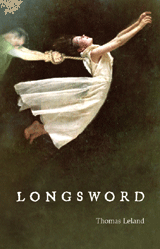Longsword
Thomas Leland
Edited and introduced by Albert Power
Cover image by Ellen McDermott
"Death's but a Path that must be trod, / If Man wou'd ever pass to God" — Thomas Parnell
Longsword, Earl of Salisbury, by eighteenth century Dublin-born clergyman Thomas Leland, is a fast-paced historical romance of medieval menace and high excitement. Set in the early years of the thirteenth century, it features a blend of real and created characters in a mêlée of intrigue, corruption, lust, and revenge. In part a metaphor for the tug-of-war between the sexes, Longsword is the definitive precursor to the Gothic novel; both in trappings and in style, it provides vital elements of prototype for Walpole's The Castle of Otranto and Lewis's The Monk. Through Longsword, Leland emerges as a forerunner of fellow Dublin clergyman Charles Robert Maturin, author of Melmoth the Wanderer. This 250th anniversary edition is edited and introduced by Albert Power.
Thomas Leland (1722-1785) was born in Dublin. Ordained to ministry in the Church of Ireland, his works include History of Philip, King of Macedon (1758), History of Ireland (1773), and a posthumous collection of sermons (1788). His only work of fiction, Longsword, Earl of Salisbury, was published in 1762. It was adapted for stage in 1765 as The Countess of Salisbury by fellow Dubliner Hall Hartson. The play remained popular into the early nineteenth century.
Albert Power is a writer and Gothic scholar. In 2011, he edited and introduced The Complete Ghost Stories of Chapelizod by J.S. Le Fanu for Swan River Press. He has published essays on William Beckford, Ann Radcliffe, Wilkie Collins, and J.S. Le Fanu, among others, and lectured and given television interviews about Bram Stoker. In 2010, he treated in a National Library of Ireland lecture of literary affinities between Charles Maturin and Oscar Wilde. His fiction has been published by Ex Occidente Press.
Limited to 200 hardcover copies
| Publisher | Swan River Press |
|---|


